The National Hospital Insurance Fund’s (NHIF) Chief Executive Officer Geoffrey Mwangi and the institution’s head of Finance Wilbert Kurgat were arrested last evening by officers from the Directorate of Criminal Investigation.
Although we could not independently establish the charges to be preferred against the two, sources told the local papers that they have been arrested and subsequently grilled for alleged obstruction of justice in an ongoing graft probe at the multi-billion-shilling health insurer.
DCI boss George Kinoti confirmed the arrest of the two. “They have been arrested and are being questioned over claims of graft at the insurance agency amounting to more than Sh1 billion,” Kinoti said.
Last night, the two were trying to negotiate for cashbail as they waited for possible arraignment before the courts, the Standard Reported Saturday.
Sources within DCI also said the questioning was being conducted by Kinoti, who as the arrest happened, landed into the country from an official trip to Dubai.
Mr Mwangi was appointed Acting Chief Executive in 2016. Over the past two years, the fund has been on an expansion spree trying to leverage itself in the country’s quest for universal health care.
Sources privy to details of the arrest said that the two had been called to DCI headquarters along Kiambu Road before investigators decided to detain them saying they had refused to release documents key in the investigation of possible graft at the insurer.
In April, NHIF was put on the spot by the Auditor General’s office for escalating the cost of building the multi-storeyed car park by 337 per cent of the original cost. Auditor General Edward Ouko said NHIF has never justified the increased cost from Sh909.7 million to Sh4 billion.
A month before the release of the auditor General’s report, the Ethics and Anti- Corruption Commission and the Public Procurement Regulatory Authority launched separate investigations into the possible loss of Sh400 million in a questionable payout to two health insurers against an order by the Public Procurement Administrative Review Board, We had written about the scandal
Corruption: NHIF CEO Geoffrey Mwangi Has Looted Approximately Ksh.6 Billion.
Earlier in the year, the fund, through a Bill in Parliament, proposed to double the contribution made by top earners, coming barely three years after it raised workers contributions from Sh320 to a graduated scale of between Sh500 and Sh1,700 per month based on each worker’s monthly pay.
Last year, more than 6.5 million people made contributions to the insurer, up from some 5.2 million who were contributors the previous year on the back of an aggressive recruitment of contributors from the informal sector.
From this, the fund raised some Sh33.5 billion from Kenyans in 2017.
“We are trying to fill a gap by campaigning to get the about 12 million Kenyans in the informal sector who are not registered by NHIF, with a Sh80 billion opportunity,” Mwangi told the press during NHIF’s 50-year celebration in Nairobi last year.
NHIF was established in 1966 as a department in the Ministry of Health to provide health insurance exclusively for those in the formal employment. In 1972 an amendment to the Constitution was made to allow for membership for those in the informal employment.
The Fund was then transformed into a state corporation through an Act of parliament, NHIF Act No. 9 of 1998. The Fund’s core mandate is to provide social medical insurance cover to all its members and their declared dependents.
The arrests of CEO Mwangi and Finance chief Kurgat is yet another indication that the country’s investigative agencies are responding to President Uhuru Kenyatta’s anti-graft purge.
A double assault from the DCI and the Director of Public Prosection has rejuvenated Kenyatta’s war on graft with the two, on separate occasions, appealing to the Judiciary to speed up the hearing of graft cases.
Top officers from government institutions such as the Kenya Power and Lightening Company and the National Youth Service have in the past few months been arrested and subsequently charged before the courts.
The political class too has not been spared, with current and former governors as well as junior county officials facing corruption related offences before the courts.
Credit: Standard

















































